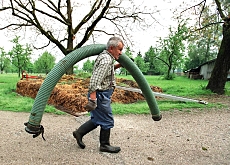Firms look to retain their older employees

As unions campaign to allow flexible retirement from the age of 62, some large Swiss companies are trying to keep older employees on the payroll beyond 65.
The Tages-Anzeiger newspaper of Zurich says research shows firms including ABB Switzerland are seeking to address an anticipated future shortage in the labour market.
In ten years’ time children of the baby-boom generation of the 1950s will reach retirement age. The State Secretariat for Economic Affairs (Seco) believes that from that point the working population will start to fall.
This appears to be forcing firms to rethink their personnel policy. Until now they have used early retirement as a means to reduce their workforces, especially during restructuring rounds.
But in future they will probably try to encourage these older workers to stay on, according to Professor Martina Zölch, who is leading a research project into the subject at the Applied Sciences University Northwestern Switzerland.
“Otherwise firms risk losing a lot of know-how at one fell swoop and having to recruit new workers from a dried up labour market,” Zölch told the paper.
Ewald Ackermann, a spokesman for the Swiss Federation of Trade Unions, said he welcomed signs that companies were beginning to appreciate their older staff members.
“We would see it as a positive sign if firms stopped showing employees the door at age 62,” he told swissinfo.
Guidelines
Employers are urging action. The Swiss Employers’ Association and the Swiss organisation for the elderly, Pro Senectute, are currently working on guidelines for firms.
Workers should be allowed to gradually reduce their working hours before retiring completely, according to the director of the employers’ association, Peter Hasler.
“We should value our older workers,” Hasler told swissinfo. “That means employers must be much more flexible in terms of working conditions, for example in allowing staff to reduce their hours gradually.”
“We have also noted that mixed teams [of young and older workers] function better and intellectual ability is what counts. Apart from certain professions, physical strength is not that important any more.”
But Hasler said that while some big firms were revising their retirement policy it could not yet be described as a trend.
A spokesman for ABB Switzerland, Lukas Inderfurth, told swissinfo his company was looking at ways of improving its policy towards workers in the 50 plus bracket.
“Older workers are becoming more and more important for the firm in view of the evolving demographic situation in Switzerland,” Inderfurth said.
The ABB spokesman said his company was considering allowing older workers more flexibility in the jobs they occupy to allow them to use their skills to the full.
Inderfurth admitted that older workers cost the firm more money but added: “We have put in place a new system which takes no account of age or experience but depends just on the post. The salary is the same regardless of the age of the employee.”
Changing society
A key government advisory committee warned in October that a rise in the retirement age was inevitable in the long run, and that the “dogma” of drawing a pension from 65 would have to be abandoned.
The government is also in favour of pushing back the age at which workers draw pensions, and has been withdrawing incentives to early retirement.
The Interior Minister, Pascal Couchepin, has gone as far as to suggest increasing the retirement age to 67, but unions did not welcome the idea.
The Swiss Federation of Trade Unions is campaigning instead for flexible retirement from the age of 62 and is collecting signatures to force a referendum on the issue.
swissinfo
The government wants people to work longer and is looking at doing away with incentives to early retirement.
The 11th revision of the law on old-age and survivors’ pensions envisages a more flexible retirement age. Unions are also calling for greater flexibility.
Training and occupation schemes for older jobless workers are to be increased.
The federal administration will no longer be allowed to make early retirement compulsory.
The authorities want to improve the health of older people through various campaigns in a bid to counter age discrimination.

In compliance with the JTI standards
More: SWI swissinfo.ch certified by the Journalism Trust Initiative











You can find an overview of ongoing debates with our journalists here . Please join us!
If you want to start a conversation about a topic raised in this article or want to report factual errors, email us at english@swissinfo.ch.